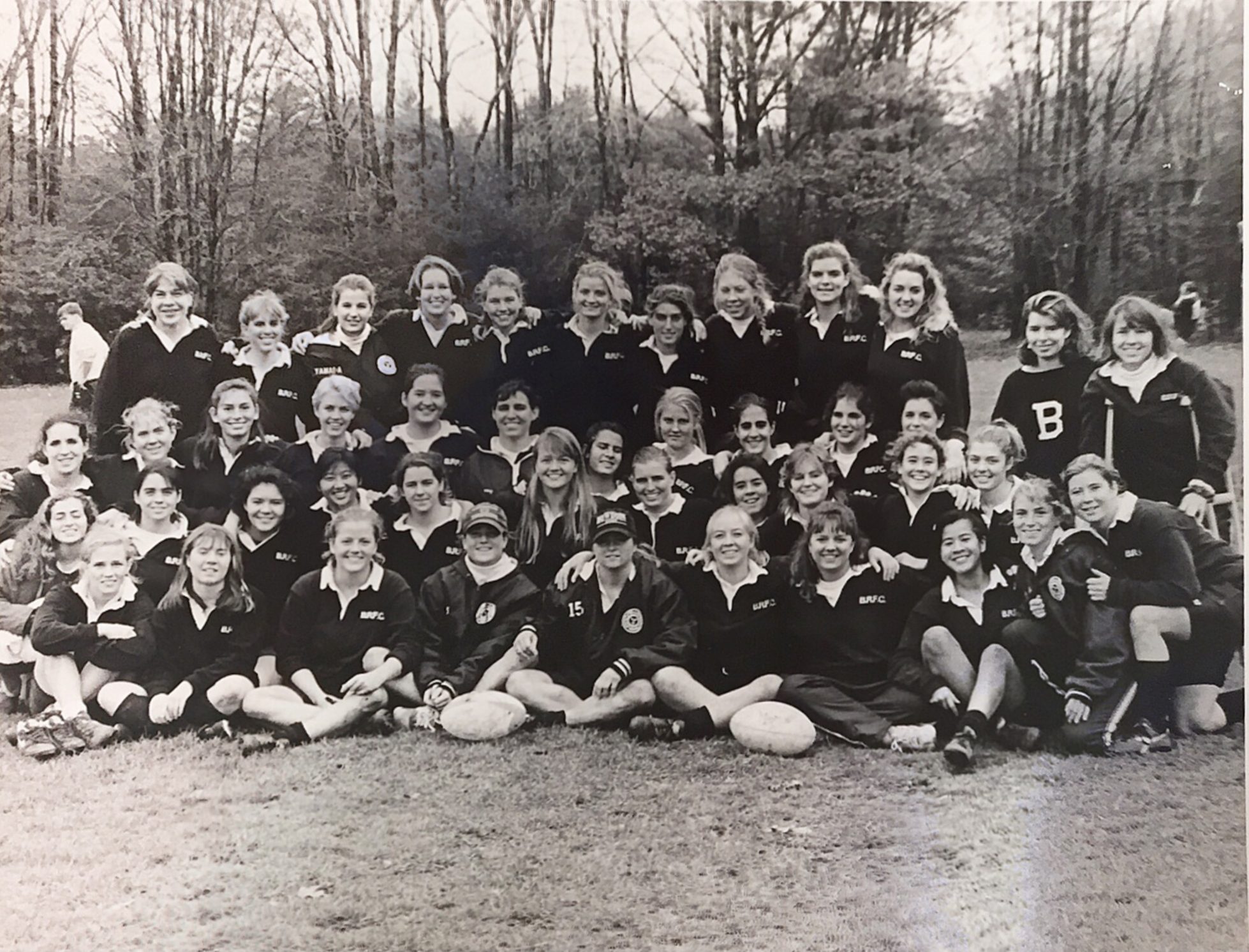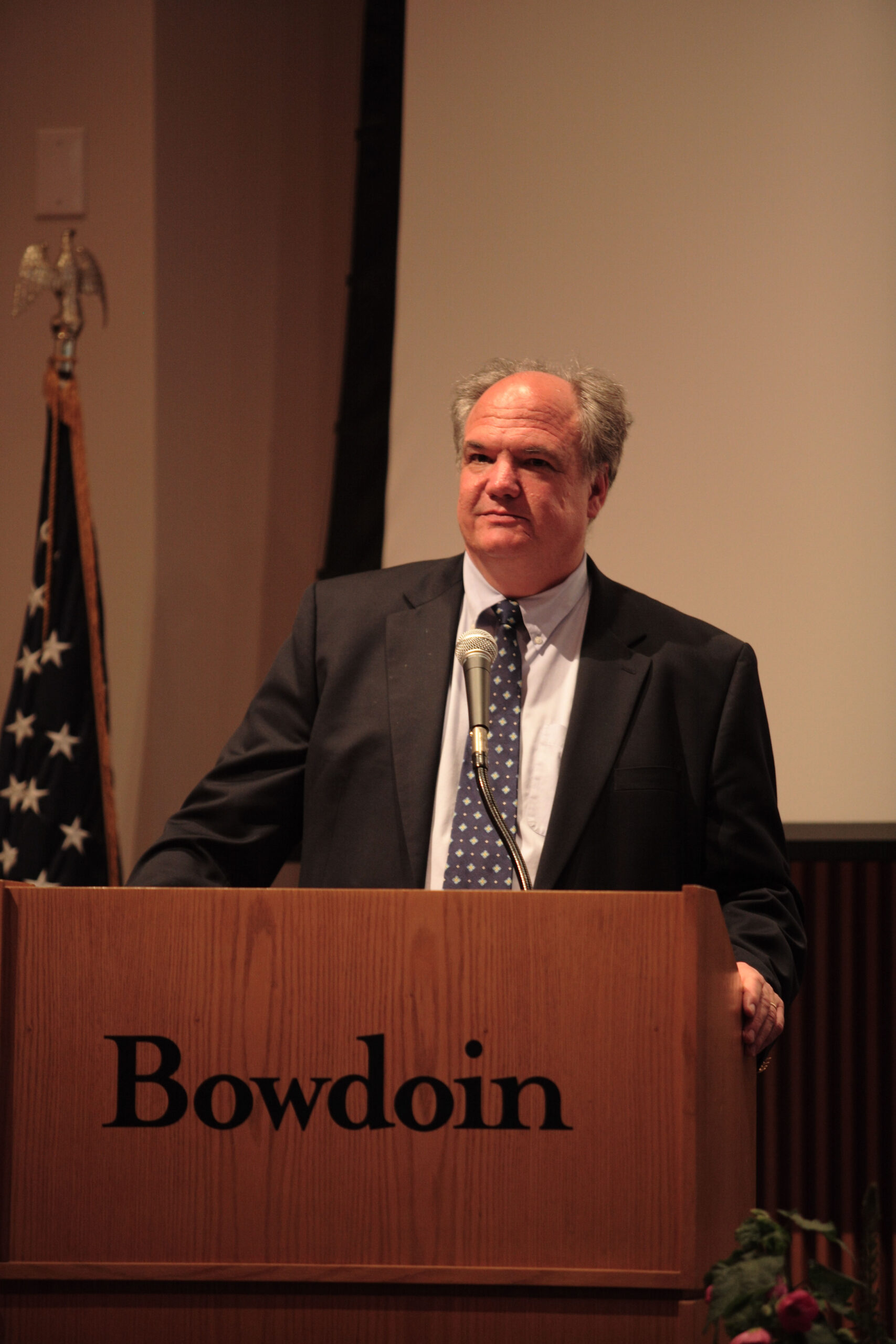Women’s rugby named as one of the most impactful programs in the country
April 15, 2021
 Courtesy of MaryBeth Mathews
Courtesy of MaryBeth MathewsHighlighting the work of women’s rugby Head Coach MaryBeth Mathews, the U.S. Women’s Rugby Foundation (USWRF) added Bowdoin’s women’s rugby team to their list of the 15 most influential programs in the nation this past March.
However, the road for Mathews and women’s rugby has not always been easy, and Mathews stresses that support from others in the community is what has made hers and Bowdoin’s impact on women’s rugby so powerful.
Founded in 1982, women’s rugby at Bowdoin began as a club sport, but it quickly gained in popularity, and the team grew to about 60 women by 1994. That’s when the club leaders at the time, Kristin (Noonan) Hall ’95 and Gina (Kuechle) Kyle ’96, decided they needed a coach, so they called up Mathews, who had been playing rugby professionally on the Portland women’s team.
“They called me relentlessly over the fall and winter of [1993] asking me to come coach, but I had another career. I had two young daughters. I was not a coach. I was still playing [rugby]. I just kept saying, ‘No, I don’t think I can’ and ‘you don’t want me.’ But they were persistent,” said Mathews. “And in the spring of 1994, I said, ‘Okay, fine. I’ll come on up to practice. We can get some gals on the field and we’ll toss the ball around. We’ll see how it goes.’ It was love at first sight. It was incredible.”
 Courtesy of Bowdoin Athletics
Courtesy of Bowdoin Athletics“Ward approached me and said, ‘Would you like the Women’s rugby team to go varsity? I would like it to go varsity. And here’s why.’ I always admired this because I don’t think it was totally for Title IX reasons, or not totally. He said that he wanted to recognize and reward a women’s contact sport,” Mathews said.
Bowdoin’s women’s rugby team was soon certified as the first collegiate women’s rugby team in the country, in what Ward called one of the best decisions he had ever made.
“It was a very successful, healthy club program. I thought MaryBeth Mathews was doing a really good job of running the program,” Ward said in a phone interview with the Orient. “I feared that if we didn’t upgrade the program, we might lose her as a coach, and coaches are really the most important thing about programs.”
While there were trepidations about transitioning to a varsity team—including from Mathews herself—women’s rugby alumni, players and coaches soon realized the new status was just a title.
“Some students were very uncomfortable with it. I was uneasy with the change, and we discussed and wrestled with it for a full year,” Mathews said. “At the end of the day, it was very simple: ‘varsity’ is just a word, and we get to define it. If it means support from the College, respect from the College and more recognition for the sport, why wouldn’t we? Everything that we’re afraid of, we can define. It’s still going to be fun.”
Yet, as women’s rugby grew as a program, not just at Bowdoin but around the country, Mathews and the team had trouble finding strong competition.
“There were other competitive teams. We’ve always loved playing Tufts, Colby and Middlebury, all of which were pretty good teams,” Mathews said. “But other NCAA women’s rugby teams were finding in their conferences, too, that there wasn’t enough competition.”
Therefore, with the help of the NCAA Emerging Sports Committee, Mathews got together with coaches from Dartmouth, Brown, Quinnipiac and many schools that were a part of the American Collegiate Rugby Association (ACRA) and formed the National Intercollegiate Rugby Association (NIRA)—a conference dedicated to women’s rugby competition.
“Women’s rugby has been on the emerging sports list for a long time,” said Mathews. “I think one of the big reasons is it is a participation sport. Its rosters have big numbers and diversity [in terms of race, sexuality and socioeconomic status]. It’s very affordable as team sports go. And all the benefits that we’ve seen here at Bowdoin, all the intangibles, the character and the leadership, the things that they gain—that lasts for them for the rest of their lives.”
 Courtesy of Bowdoin Athletics
Courtesy of Bowdoin Athletics
Through Mathew’s, Ward’s and the College community’s commitment to the sport, Bowdoin has truly shaped the national status of women’s rugby.
“The undaunting enthusiasm for the sport of rugby because of its benefits for girls and women (and later, their families and communities), and the tireless efforts to bring equity, opportunity and support to those who play, coach, referee, report and watch it … is ultimately why I did what I did, and continue to do what I do and there are so many others involved,” Mathews wrote in an email to the Orient. “Because of my position at Bowdoin College, I was given the opportunities to make a difference. There was a lot of frustration, help and support along the way!”

Comments
Before submitting a comment, please review our comment policy. Some key points from the policy: